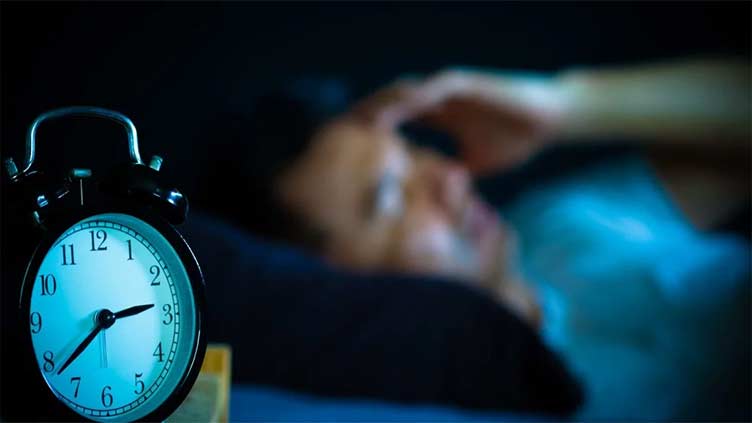Study finds people with insomnia nearly 70% more at risk for a heart attack

Lack of sleep can lead to a long list of chronic health issues.
ISLAMABAD, (Online) - Approximately 1 in 3 adults in the US not getting enough sleep, insomnia is a common health problem.
Lack of sleep can lead to a long list of chronic health issues, including heart disease, diabetes, stroke, high blood pressure, obesity and depression.
According to a new study published Friday in Clinical Cardiology,people who suffer from insomnia were 69% more likely to have a heart attack compared to those who didn’t. The research was taken from an average of nine years of follow-up among patients.
Additionally, researchers found that people who slept five or fewer hours had the highest chance of suffering a heart attack. Those with diabetes and insomnia had double the risk of having a heart attack.
What the study found
They gathered data from 1,184,256 adults (43% were women). The average age was 52 years and 13% (153,881) had insomnia. Being diagnosed with insomnia was determined by having any of the following: trouble falling asleep, trouble staying asleep or waking early and not being able to fall back to sleep.
It’s important to note that 96% of patients did not have a previous history of heart attack. Heart attacks occurred in 2,406 of patients with insomnia and 12,398 in the group who didn’t have insomnia.
Results showed a direct correlation between insomnia and having a heart attack among all patients, regardless of age, sex, follow-up duration, and common comorbidities (including diabetes, high blood pressure or cholesterol).
Specifically, those who slept five or fewer hours a night were 1.38 and 1.56 times more likely to experience a heart attack compared with those who slept six and seven to eight hours a night.
Yomna E. Dean, a medical student at Alexandria University in Alexandria, Egypt, and author of the study explained the main takeaways from the study.
First, “insomnia puts us at risk of developing heart attacks; subsequently, patients should be educated about the importance of sleep in maintaining a healthy heart,” Dean told Healthline. “Sleep should be incorporated into the primary preventive guidelines for cardiovascular disease.”
Second, insomniacs should be regularly screened for coronary artery disease.
Lastly, excessive sleep could be equally and sometimes even more harmful than sleep deprivation, Dean added.
Sleep and heart health
The connection between sleep and the heart has many layers.
“One layer is the amount of sleep — people who do not get enough sleep are not able to provide their body with the amount of all the different sleep stages needed to maintain optimal functioning,” said Michael A. Grandner, Ph.D., MTR, volunteer medical expert for American Heart Association’s (AHA) Go Red for Women initiative, co-author of the AHA’s new Life’s Essential 8 cardiovascular health score.
Also important is sleep quality.
“Even if you get enough sleep, sometimes sleep can be shallow and fragmented, which also prevents your body from performing all the maintenance it needs during that time. Other dimensions are important too,” Dr. Grandner explained.
For example, a recent studyTrusted Source showed that irregular sleep patterns on their own can contribute to atherosclerosis risk, and people who are very sleepy during the day also are more likely to have cardiovascular events, Dr. Grander added.
“Sleep is vital in helping the body repair itself,” said Wafi Momin, DO, a cardiologist with UTHealth Houston Heart & Vascular and Memorial Hermann. “Getting at least seven hours of sleep each night helps your body recover and allows you to function normally the following day.”
Getting enough shut-eye can also help manage blood pressure, blood sugar and weight, all of which contribute to heart health.
“Regular, consistent sleep also helps regulate blood pressure, sugar levels as well as weight,” Dr. Momin said. “These health problems are linked to heart diseases such as heart attack and stroke so getting plenty of sleep and regulating these risk factors can be of much help.”
Sleep deprivation, a consequence of insomnia, puts the body under stress, triggering cortisol release which could accelerate atherosclerosis, Dean explained. A studyTrusted Source conducted on patients who developed acute myocardial infarction (MI) found that the concentration of cortisol in their hair was elevated in the month preceding the MI.
Tips to get a good night’s sleep
Proper sleep hygiene is crucial. Dean suggested:
• Avoiding uncomfortable temperatures, light, and noises in the bedroom.
• Limiting the screen time an hour prior to bed at the minimum.
• Avoiding heavy meals near bedtime.
• Avoiding caffeine prior to bedtime.
Additionally, Dr. Grandner recommended giving yourself enough time and space to wind down at night.
“When you get into bed, your mind and body should be ready to detach from the day. that means putting down screens, engaging in relaxing behaviors, and avoiding eating or drinking too much too close to bedtime,” Dr. Grandner stated.
Also, when you are in bed, it is important not to spend too much time laying in bed awake.
If you cannot sleep, you should get out of bed and only get back into bed if sleep is possible. It may mean less sleep opportunity tonight but it can prevent longer-term insomnia, Dr. Grandner explained.
The main cause of long-term insomnia is people struggling too much to sleep, and sleep becoming so stressful that the stress of not sleeping keeps you awake and it becomes a self-fulfilling prophecy. The best way to avoid this is to break the bed-equals-wake cycle and support a bed-equals-sleep connection when you can, Dr. Grandner added.

